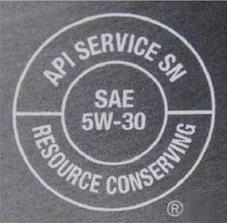 November 2020
November 2020
Continued from page 8)
| |
the same given high or low temperature variation. Their higher cost is the result of the expense of catalysts and lower yields as parts of the hydrocarbon are removed. Mobil sells PAO and Chevron also sells this alongside its Group II products.
|
API SN Plus certified an engine oil in 6 areas. This is where additive chemistry comes to play.

The first number in the SAE grade (sometimes called the front number) has nothing to do with how tight the engine is built or the tolerances. But the back number has everything to do with both of those factors. The first number is the start-up viscosity in cold weather. Once the engine thermostat opens, the back number is the viscosity that is protecting the engine.
|
| |
Hold contaminant particles in suspension -
|
| |
|
This is accomplished with a dispersant. Dispersants will surround and then suspend dirt (for lack of a better word) away from the engine’s metallurgy protecting metal parts.
|
| |
Provide for anti-wear amp; oxidation stability - |
|
| |
Combustion produces organic acids which are corrosive to metal parts. These are aggravated by higher operating temperatures. AW Additives neutralize these organic acids.
|
| |
Protect against formation of foam - |
|
| |
Foam (bubbles) in a crankcase cause many problems by reducing oil circulation, restricting oil filtration, and raising engine temperature. This can be a bigger issue for our MGs as they generally use higher viscosity oils, more prone to foaming. Foam Inhibitors are normally polymers that break surface tension of foam.
|
| |
Provide for improved cold weather operation - |
|
| |
In cold weather oil flow to moving parts is reduced due to the waxy (heavier) nature of molecules. Pour Point Depressants lower solidification temperature by blocking wax crystal growth in the base oil.
|
| |
Maintain oil viscosity as engine temperatures increase/decrease - |
|
| |
Viscosity Improvers (VI) are oil soluble polymers found in multi-grade engine oils. At low temp, the viscosity of the oil will prevail while at higher temp the VI thickens the oil to a higher SAE grade. In a 20W-50 oil the "W" stands for WINTER grade SAE viscosity.
|
| |
Keeping the oil clean - |
|
| |
This is done with the use of Detergents. These are generally soaps that seek to maintain higher temperature engine cleanliness by neutralizing combustion by-products.
|
What's best for our MGs?
All API category SN Plus oils are fine. Normally MG owners prefer heavier grades i.e. 20W-50 and it is true that tolerances of 60s/70s MG are loose vs. a modern car that requires a 5W-30 or 20. Whether one wants a synthetic vs. conventional SN Plus oil is a matter of personal choice. I personally use synthetic in engine and differential but use a conventional non-detergent SAE 30 in my Leyland overdrive transmission, as I am told it contains some yellow metals and the phosphorous in detergent oils can be corrosive to copper, bronze, brass, etc...
Synthetics are not needed for how most of us drive our MGs. Most of our cars are fairly dormant in winter. The high temps needed to justify synthetic oxidation resistance would lend themselves more to racing situations than rallies, shows and weekend tour driving. Because a PAO synthetic oil virtually eliminates waxy molecules it can have more solvency than conventional engine oils. This solvency can react with OLD engine seals shrinking them and causing oil leaks (like we don't have enough of that already).
On a personal comment, I believe changing the oil in an MG that has sat through winter storage in a dry closed garage, is not necessarily required if the oil does not have much mileage on it. My personal choice is to pull the spark plugs and rotate the engine by grabbing the fan belt in my right hand, and a fan blade in my left. Rotating by hand for 5-10 minutes does get the oil up into the crown land piston area.
Do our MGs require supplemental additives? My answer is no and in 50 years I have never used these. Frankly, they are expensive, and I question their real effectiveness. Some folks swear by them and that does make it a personal choice. Modern conventional engine oils are formulated to provide everything an MG in good mechanical shape requires.
Note: Semi-synthetics. These are engine oils that mix some synthetic with conventional base oil prior to additive treatment. The synthetic % of total base oil will range from 10 to 30% prox. Are they better? Well, rather than state feeling on these I would say that if the conventional base oil component is 70 to 90% of total, I wonder what happens to that component when temperature rises?
Editor’s Note:
I had been asked to write up a presentation made to the Chicagoland MG Club on engine oil technology some time ago. It's been several years, and many members did not have this. I worked for 35 years in lubricants with a major oil company and have owned MGBs for 50 years.
https://www.machinerylubrication.com/Read/31395/engine-oils-filters
|
|
Pg 9 of 16
   

©2020 Chicagoland MG Club, All rights reserved.
|